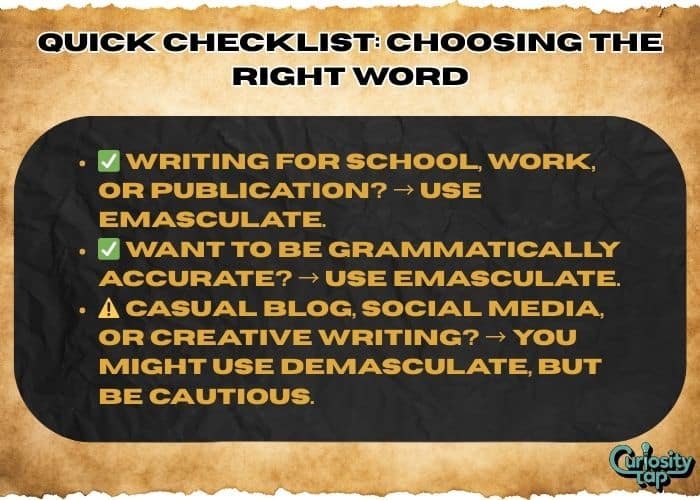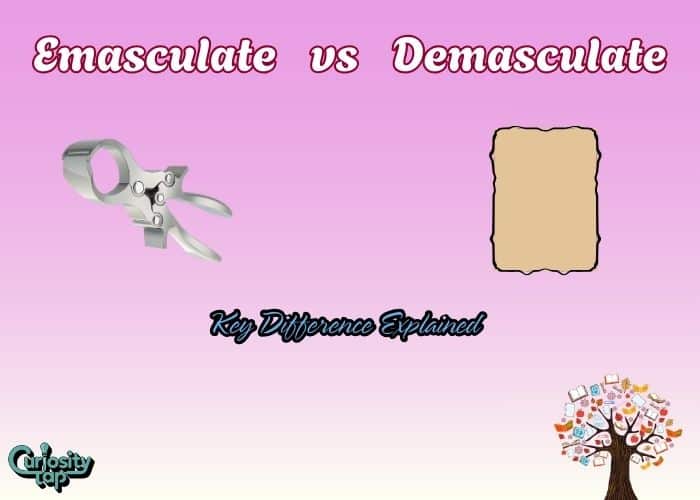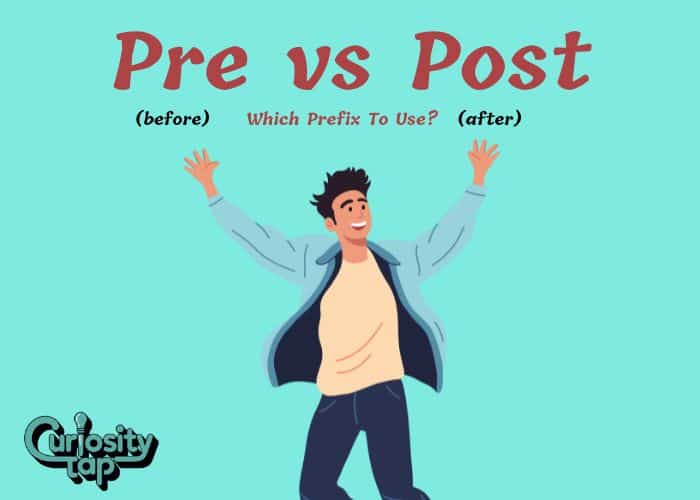Language often evolves in subtle ways, and sometimes similar-sounding words create confusion. A great example is emasculate vs. demasculate.
At first glance, they may look like interchangeable terms, but in reality, one is a widely recognized word with clear usage, while the other is a less common, often misused variant.
If you’ve ever stumbled over these two words, you’re not alone. Let’s break down their origins, meanings, correct contexts, and the key difference that matters in both writing and conversation.
What Does Emasculate Mean?
The word emasculate comes from the Latin emasculare, meaning “to castrate” or “to weaken.” Over time, its meaning broadened beyond the physical sense to a more figurative one.
Literal Meaning
- Historically, it referred to depriving a man of his male identity or strength.
- Example: “The harsh punishment was designed to emasculate the prisoner.”
Figurative Meaning
- Today, it is widely used to mean weaken, humiliate, or strip someone of power or confidence.
- Example: “Criticizing an employee in public can emasculate them and lower morale.”
What Does Demasculate Mean?
Unlike its counterpart, demasculate is not a standard dictionary entry. It appears occasionally in modern texts, often used as a variant of emasculate, but it lacks formal recognition in major dictionaries like Merriam-Webster or Oxford English Dictionary.
Usage Notes
- It sometimes surfaces in social commentary or casual speech.
- Writers may use it as an intentional stylistic choice, but it is less authoritative than emasculate.
- Example: “The system is designed to demasculate individuals who challenge authority.”
👉 In short: demasculate is a nonstandard or emerging word, while emasculate is the established and correct form.
Emasculate vs. Demasculate: Key Differences
| Feature | Emasculate | Demasculate |
|---|---|---|
| Recognition | Standard, dictionary-approved | Nonstandard, rarely recognized |
| Origin | Latin emasculare | Likely formed from “de-” prefix + masculine |
| Common Usage | Formal writing, academic, everyday contexts | Informal, online discussions |
| Credibility | High | Low |
Real-Life Example: Workplace Power Dynamics
Consider a corporate setting where a manager publicly criticizes a team member during a meeting.
The employee feels stripped of confidence and humiliated in front of colleagues. In this context, the correct word is emasculated, not demasculated.
Yet, in online forums or casual commentary, people may mistakenly use demasculate to describe the same scenario.
This reflects how language shifts in informal contexts but highlights why knowing the standard form is essential in professional communication.
Also Read:
Other Than or Other Then: Correct Usage Explained
Excel vs Accel: Can You Spell It Right?
Excell or Excel: Which Spelling Is Accurate?
Momma or Mama: Which Spelling Is Correct?
Pronounciation or Pronunciation: Which Is Correct?
When Should You Use Each Term?
✅ Use Emasculate When:
- Writing professionally, academically, or in business contexts.
- You want to maintain credibility and clarity.
- Referring to established definitions supported by dictionaries.
⚠️ Avoid or Limit Demasculate Because:
- It lacks recognition in authoritative sources.
- It may confuse readers or reduce the professionalism of your writing.
- Its use may only be appropriate in informal or creative contexts.
Pros & Cons of Each Term
Emasculate
Pros
- Standardized and widely accepted.
- Clear meaning and strong historical roots.
- Works in both literal and figurative contexts.
Cons
- Can carry heavy negative connotations.
- May be misinterpreted as too harsh in certain contexts.
Demasculate
Pros
- Creative or stylistic use in informal writing.
- Sometimes used in pop culture or casual online spaces.
Cons
- Not officially recognized in major dictionaries.
- Risks reducing credibility in serious writing.
- May confuse readers unfamiliar with the term.

Quick Checklist: Choosing the Right Word
- ✅ Writing for school, work, or publication? → Use emasculate.
- ✅ Want to be grammatically accurate? → Use emasculate.
- ⚠️ Casual blog, social media, or creative writing? → You might use demasculate, but be cautious.
FAQs on Emasculate vs. Demasculate
Is demasculate a real word?
It appears in informal contexts, but it is not formally recognized in major dictionaries.
Which is correct: emasculate or demasculate?
Emasculate is the correct, dictionary-approved word.
Can emasculate be used for both men and women?
Yes. Though historically linked to men, it now applies broadly to anyone being weakened, humiliated, or disempowered.
Why do people use demasculate?
Likely because of the common “de-” prefix pattern in English (e.g., defame, deactivate). However, it remains nonstandard.
Should I use demasculate in academic writing?
No. Stick with emasculate for accuracy and credibility.
Conclusion
The debate of emasculate vs. demasculate highlights how language evolves and sometimes confuses.
While demasculate surfaces occasionally, emasculate is the correct and professional choice.
If your goal is clear, authoritative, and polished communication whether in essays, workplace reports, or journalism choose emasculate. Save demasculate for informal or stylistic experimentation.
Call to Action
Want to sharpen your English and write successfully every time?
Check out our Grammar Checker Tool and never second-guess your spelling again!
Read our guide on Common English Misspellings to boost your skills even further.
Sources List
Sources:
- Merriam-Webster Dictionary. (2025). Emasculate. Retrieved from: https://www.merriam-webster.com
- Oxford English Dictionary. (2025). Emasculate. Retrieved from: https://www.oed.com
- Cambridge Dictionary. (2025). Emasculate. Retrieved from: https://dictionary.cambridge.org
Read more knowledgeable blogs on Curiosity Tap
Is this article helpful?

Jackson Pearson is a passionate educator and language enthusiast behind the blog Jackson Pearson. With years of experience in teaching and writing, he specializes in simplifying complex grammar rules, breaking down tricky vocabulary, and crafting learning guides that are both engaging and practical. His mission is to help readers boost their English skills whether they’re beginners or brushing up for fluency. Through every article, Jackson brings clarity, structure, and a spark of curiosity to the world of English learning.



